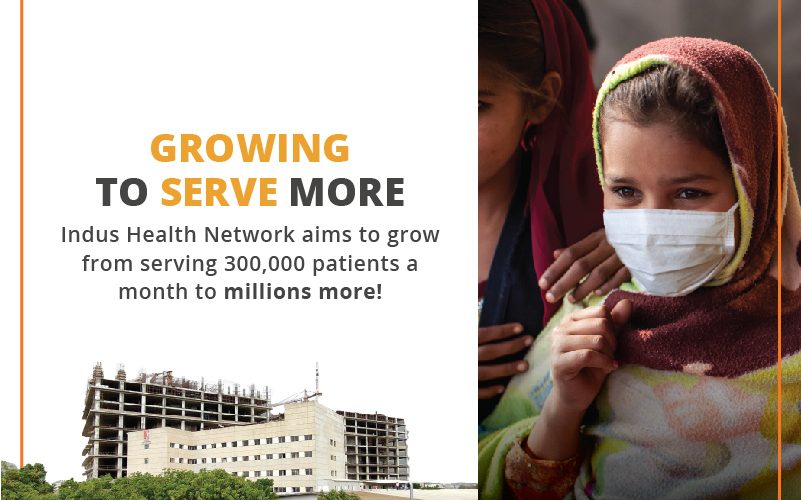GROWING TO SERVE MORE
In Pakistan where dealing with polio or epidemics such as dengue and hepatitis C has been quite troublesome, tackling Covid-19, a once-in-a-century scale pandemic has become a daunting task considering the abysmal condition of the health sector. Characterized by lack of proper infrastructure along with a very limited budget — one of the lowest in the region — the healthcare system brought an unprecedented strain both on public and private sector hospitals and clinics across the country. From an acute shortage of testing and medical supplies to issues in access among rural and underserved populations, the Covid-19 pandemic has blaringly proved the failure of the provision of timely and quality healthcare.
As Pakistan continues to grapple with the pandemic, the Indus Health Network (IHN), as a torch bearer for quality and free healthcare in Pakistan has played a leading role from the onset of Covid-19 pandemic. Committed to bring a paradigm shift in healthcare delivery system, the network has been working on establishing a healthcare system that is better equipped to tackle such pandemics without compromising on regular healthcare services. The network consists of 12 hospitals (out of which four are owned and managed by IHN and eight are only managed by IHN under the umbrella of public-private partnership), four regional blood centers, four physical and rehabilitation centers, Pakistan’s largest Paediatric Oncology Services Unit, a network of primary care centers and a large number of public health initiatives in 52 districts across Pakistan.
With staggering increase in the volumes of patients coming to The Indus Hospital, Korangi Campus in Karachi (TIH), the management took a key strategic decision and decided to expand its facilities and services across Pakistan. In view of this decision, the Network initiated two major projects: Expansion of the current 300 bed Korangi Campus in Karachi to a 1,000- bed facility equipped with all clinical and allied health services under one roof; and construction of a new 600-bed tertiary care hospital in Lahore — The Indus Hospital, Qarshi Foundation and Naimat Saleem Trust (QF and NST) Campus.
The Indus Hospital, Korangi Campus in Karachi is the flagship hospital of the Network. Once completed, this hospital will be one of the largest free-of-cost hospital in the private healthcare sector of Pakistan. With the success of managing public hospitals in partnership with the Government of Punjab, the management initiated the plan to construct IHN’s fully owned 600-bed tertiary care facility in Lahore — The Indus Hospital, QF and NST Campus. The Campus will have modern medical facilities such as oncology, endoscopy, gynecology, cardiology, dialysis center, diagnostic imaging, accident and emergency, and other medical services. The project is to be completed in three phases and it is estimated that more than one million patients per year will benefit from the free and quality health services. The initial phase of the project includes OPD, emergency and surgical wards with 92 beds and is targeted to be completed by early next year (subject to achieving fund-raising targets).
Supporting these tertiary hospitals and reaching out to communities that have no or poor access to basic quality healthcare services, a network of primary care centers is also being established across Pakistan under the mandate of the public health arm of IHN, the Global Health Directorate. Currently, it manages 23 primary care facilities across the country.
IHN has a mandate of being innovative and finding cost-effective solutions for the provision of basic health services. A container-based clinic is one such unique cost-effective solution that addresses the health needs of Pakistan’s rural population, which is majorly characterized by long distances to healthcare facilities that cause individuals to forgo basic healthcare needs. The facility can be dismantled and reassembled, customized, extended and expanded, considering the healthcare needs of the population. These portable clinics are designed after a thorough needs assessment of areas. Factors such as population density, accessibility to other health facilities, operational capacity, the local disease burden and community needs are analyzed.
The first container facility was launched and is now fully functional at Khorwah Chowk, Badin district in Sindh. The clinic can facilitate upto 200 patients per day with free-of-cost services. The second container facility has been launched at Shadi Larg, another very remote area of district Badin.
To reach some of the more far-flung areas in Lower Sindh and Lower Punjab, IHN plans to establish more of these container clinics, mobile clinics and boat clinics to help make basic healthcare accessible to millions of people, mitigating their barriers to healthcare accessibility.
Another factor for the poor healthcare service delivery in Pakistan is the unavailability of qualified and well-trained healthcare professionals. In response to this grieving issue, IHN plans to establish a state-of-the-art Indus University of Health Sciences (IUHS). The University is planned to start in the fall of 2022 with the following six colleges: Indus College of Nursing and Midwifery; Indus Medical College; Indus College of Allied Health; Indus College of Physical Rehabilitation; Indus College of Dentistry; and Indus College of Public Health. When fully functional, IUHS will have a total enrolment of 2,500 students adding trained high quality healthcare professionals to Pakistan’s workforce which will become a yearly contribution towards the human capital pool of Pakistan.
IHN is invested in community health and well-being initiatives to improve the overall health of the people it serves. Pakistan and the rest of the world still continues to tackle the ongoing health crisis, but if this is used as an opportunity to reshape the healthcare delivery system by governments, policymakers, and healthcare providers, then that would be the silver lining in this pandemic.




